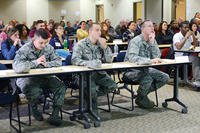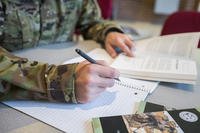LANGLEY AIR FORCE BASE, Va (AFNS) – Each year at Langley Air Force Base, Virginia, approximately 400 senior airmen and staff sergeants attend Airman Leadership School, a five-week professional military education course which serves as the educational bedrock for new noncommissioned officers.
Students enrolled in the rigorous 24-day program learn the foundations of enlisted leadership and supervision, and upon graduation become certified to rate and supervise Airmen. This first level of PME is a requirement in the maturation of Airmen – a process which can be marred irreparably by cheating.
According to Senior Master Sgt. Leyla Gillett, the Langley AFB ALS commandant, cheating and plagiarism in ALS undermines the core values Airmen swear to abide by and could have devastating consequences on their careers.
"I've seen about 15 cases of cheating or plagiarism since I've been here, the majority being early in 2011," said Gillet, now in her fourth year as commandant. "In one class, we caught four students plagiarizing using the same memorandum they found online. When we (did an online search) during grading, we were able to find the memorandum online, which looked like a previous ALS student had uploaded it. They found it, thought it was acceptable to use it as a template, changed a few words and turned it in."
Gillett said using internet-sourced materials when writing evaluations, memorandums and awards packages in the office is commonplace and acceptable, but the Thomas N. Barnes Center for Enlisted Education, the governing body of Air Force enlisted PME, classifies it as plagiarism, which is strictly prohibited.
"There are a lot of tools out there you can use in the work center which are very helpful," she said. "That's okay in the work center, but students are here to learn how to do that from scratch: how to set up margins, how to use 'The Tongue and Quill.' Copy and pasting anyone can do, but Airmen are here to learn."
During ALS, future NCOs complete a curriculum which mirrors a 365-day rating period of a junior enlisted Airman. Students create initial and midterm feedbacks, enlisted performance reports, awards packages, decoration packages - all simulating the process of supervising an Airman. The course is capped with a comprehensive multiple-choice exam.
Airman Leadership School is demanding, and sometimes students are unprepared for the tempo and workload.
"Our graduates, who are brand new staff sergeants when they (are promoted), know they're getting three or four Airmen to supervise right away," Gillett said. "We try to explain to them, 'You're going to have four brand new Airmen. You're going to be tracking (Career Development Course) progress, doing feedbacks, EPRs.' That's what we try to teach them: how to manage all of that. Hence, we really pile it on.
"It's not the average classroom and it's not like the college course you take downtown," she continued. "This is an eight-hour day at school and then there are a lot of assignments. It is intentionally stressful and sometimes some students can't deal with everything they have going on between their personal lives, family situations and managing school."
The stress of trying to manage life and ALS can sometimes leads otherwise good Airmen to make bad decisions in a panic. With promotion rates at historic lows, 32.9 percent rate in 2013 was the lowest staff sergeant promotion rate since 1998, Gillett said Airmen are under increased pressure to pass.
"I think it puts more pressure on the students," she said. "It's that panic, that moment where they ask, 'oh my gosh if I don't pass ALS, will I lose my line number?' If students are not successful academically, it can result in an academic release. That fear of failing is sometimes is a driving factor for them to make a decision to take shortcuts and turn to cheating."
When cheating is suspected, the commandant will initiate an investigation and could recommend disciplinary release. The results of the investigation are forwarded to the base legal office for review to ensure the ALS staff followed established procedures correctly.
Once the review is complete, the offending students are turned over to their units. Unit leadership is responsible for determining what discipline or administrative actions to take against the Airman.
"In the cases I've seen, it does have a negative effect on the Airmen," Gillett said. "Some had their line numbers removed and one of the students who was already a staff sergeant had his stripe taken.
"For me, it's tough when I make the decision to do a disciplinary release, because I know the impact it can have on that person's career," she said. "There have been several careers ended due to the releases I've had to do. For many, it's often not the first strike in their record. Most times, we see the loss of line number or stripe and a referral EPR, which means that Airman can't test (for promotion). If that inability to test or loss of stripe takes that person to their high year of tenure, they will have to separate from the Air Force."
Gillett said the best way to succeed in ALS, and not resort to cheating, is to be open and honest with leadership before enrolling, understand the gravity of the demanding coursework, and be prepared for it.
"The one thing I tell the students day-one is, 'yes it's a college course, yes it's stressful, but it's not rocket science,'" Gillett said. "Nothing we do here is so complicated that someone can't pass. It's a test of their time management and stress management skills – two things that will be tested on a daily basis as NCOs."
Gillett said Airmen need to study. Roughly 50 percent of enrollees fail the practice end-of-course exam and about 10 percent of students fail the final exam on the first attempt. Understanding the amount of time needed to successfully complete and master course concepts is essential to establishing a winning game plan.
"I'd recommend talking to a recent graduate," Gillett said. "We have a former student panel on the very first day of class where recent graduates come back and talk to the new class to hopefully prepare them. If Airmen have anything going on outside of work, I advise them to take care of that first, because that causes overload. Have family matters in order."
The commandant recommended communicating the scope and seriousness of the course to spouses and significant others.
"Let spouses and significant others have an idea of how much work you'll be doing," Gillett said. "One time, I actually typed a memorandum for one of the students' girlfriends because she did not understand why he was gone all the time. I had to explain that he had study groups, drill routine, classwork."
More than anything, Gillett said, Airmen need to establish the proper mindset before attending ALS.
"They're going to be busy," she said. "There's a perception that ALS is easy, and it's not an easy course. It's a lot of work, and for good reason – we're here molding the future leaders of our Air Force. We don't take that lightly, as we don't take cheating lightly. It's a compromise of our core values and we simply can't afford to let our Airmen to make those compromises."





